From the UN, A Powerful Tool to Stop Forced Sterilization
By Tamar Ezer & Tirza Leibowitz
Around the world, doctors’ offices, hospitals, and health clinics can be places of coercion and violence rather than treatment and care. This is especially so for socially excluded people, including ethnic minorities, people living with HIV, people with disabilities, and transgender and intersex persons.
Forced sterilization is a particularly egregious and too-common abuse. In the United States, North Carolina continues to grapple with the legacy of a eugenics program targeting poor African Americans, and systemic forced sterilization of women prisoners in California has just come to light. Forced sterilization of women living with HIV has been documented in countries, such as Chile, the Dominican Republic, Kenya, Namibia, and South Africa.
Many countries allow for sterilization of women and girls with disabilities without their consent and force transgender persons to undergo unwanted sterilization in order to have their preferred gender recognized. Intersex persons are subject to routine sterilization and forced genital-normalizing surgeries when they are just infants.
Now, in a groundbreaking statement released in late May, seven UN agencies—OHCHR, UN Women, UNAIDS, UNDP, UNFPA, UNICEF, and WHO—called out this abuse and issued recommendations for its prevention and elimination. This follows three years of consultation and advocacy by the Open Society Foundations and our partners.
The UN interagency statement has several significant features:
- Recognition of forced sterilization as torture and cruel, inhuman, or degrading treatment, as well as a violation of other basic human rights. This echoes the Special Rapporteur on Torture’s recent report on torture in health care settings.
- Recognition of the particular vulnerability of marginalized groups to forced sterilization, including intersex and transgender persons—specifying that sterilization, or procedures resulting in infertility, cannot be a prerequisite for legal recognition of gender identity.
- Strengthening the right of persons with disabilities to decide for themselves, instead of others deciding in their name.
- Confirmation that consent to sterilization should not be made a condition for access to medical care or for any other benefit.
- Clarification that sterilization is never an emergency procedure, and consent should not be requested when a woman is vulnerable, such as during labor.
- A focus on state obligations to investigate reports of forced sterilization, prosecute perpetrators, and provide redress, as well as to monitor and prevent violations. This includes the provision of legal aid when necessary for individuals to access justice.
- Explicit recognition of individuals’ right to access their own medical records. This has been a recurring obstacle to justice.
Advocates are now armed with a powerful tool in national efforts to end this abuse through litigation and policy reform. This statement provides important guidance to medical professionals, governments, and human rights bodies on how to identify and address forced sterilization.
These UN agencies are now working with UN treaty bodies, which are responsible for monitoring state compliance with human rights treaties, to ensure violations of forced sterilization are highlighted and states are instructed on appropriate corrective steps. The statement places emphasis on state responsibility to address forced sterilization, affirming that it is not just an individual concern.
The statement, however, still has critical gaps with regard to people with disabilities. While recognizing the particular vulnerability of women with intellectual disabilities to this abuse, it never clarifies that only the women themselves can validly consent to their own sterilization. This provides a loophole, where a guardian or court can come in and consent on their behalf, and it seems to allow for the “nontherapeutic” sterilization of children with disabilities.
We hope these gaps can be addressed soon—ensuring respect for each individual’s decision about something so fundamental and personal—and we celebrate the achievements thus far in ensuring that all health care settings become places of care for everyone.
Until June 2016, Tamar Ezer was deputy director of the Law and Health Initiative of the Open Society Public Health Program.

Tirza Leibowitz is division director of Justice at the Open Society Foundations.

